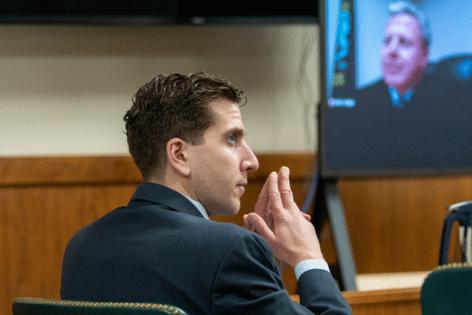Momentous evidentiary hearings await Bryan Kohberger ahead of Idaho student murder trial
Published in News & Features
BOISE, Idaho — More than 170 legal filings with considerable implications for trial in the University of Idaho student homicides case are set to near their resolution as defendant Bryan Kohberger returns to the courtroom Wednesday.
Since February, the prosecution and defense have traded more than 1,000 pages of court records over a variety of evidence. Each side has postured to limit the way certain details may be presented to a jury, while ensuring their own elements, including data and witness testimony, make the cut.
Judge Steven Hippler has scheduled oral arguments that could extend into Thursday to hear final justification for which evidence to include. His decisions on the so-called motions in limine could prove to be the difference for a conviction at Kohberger’s summer capital murder trial.
Kohberger, 30, is accused of fatally stabbing four University of Idaho undergraduates at an off-campus home in Moscow in November 2022. He is charged with four counts of first-degree murder, and prosecutors intend to seek the death penalty if he’s found guilty.
The student victims were Madison Mogen, 21, of Coeur d’Alene; Kaylee Goncalves, 21, of Rathdrum; Xana Kernodle, 20, of Post Falls; and Ethan Chapin, 20, of Mount Vernon, Washington. The three women lived in the three-story home with two other female roommates who went physically unharmed, while Chapin was Kernodle’s boyfriend and slept over for the night.
Among the leading information the defense seeks to block at trial is digital data from their client’s Amazon account. Prosecutors alleged Kohberger bought a Ka-Bar brand knife, sheath and sharpener in March 2022 from the online shopping giant, and later searched for the same knife and sheath after the students’ deaths. Police found a Ka-Bar leather knife sheath at the crime scene, which included DNA later linked to Kohberger, according to the probable cause affidavit.
The defense also asked to exclude the testimony of an Idaho State Police crime lab manager on behalf of the prosecution about the ways in which so-called “touch” or “contact” DNA can arrive on an item. Based on the defense’s submitted expert witness list, prosecutors asserted Kohberger’s attorneys will argue at trial that the sheath with Kohberger’s DNA was planted at the crime scene.
The two sides also are expected to square off over how text messages between the two surviving roommates and a 911 call made on one of their cellphones factor into the state’s time frame of the killings. Transcripts of the early morning texts and audio of the 911 call were both publicly released for the first time last month, and both the defense and prosecution have picked over elements of the evidence to carve out pieces they would like included at trial.
In addition, whether to allow specific testimony from one of the surviving roommates, who told police she saw a masked man in all black in the home on the morning of the homicides, will play a central role during this week’s hearings. The roommate said she saw a man with “bushy eyebrows,” which the defense argued jurors would believe directly identifies him as the perpetrator.
Led by Latah County Prosecutor Bill Thompson, prosecutors asked to place limits on an alibi defense previously submitted by Kohberger, that he was out driving alone at the time of the homicides outside of Moscow. They seek to force Kohberger to testify to make such an argument, while the defense plans to provide “partial corroboration” from a cellphone data expert and rejects that only their client could speak to his whereabouts on the stand at trial.
Hippler, a 4th Judicial District judge in Ada County, also will take up arguments over the possible use of a not-to-scale 3D model of the “unconventional” home where the victims died that prosecutors plan to use at trial for illustrative purposes. The defense has objected, noting a lack of information about its design and sufficient time to review the exhibit ahead of trial four months out.
The Latah County Prosecutor’s Office denied a public records request from The Idaho Statesman for an image of the model, citing the active judge’s gag order in the case. Release of the image could interfere with court proceedings and also jeopardize Kohberger’s right to a fair trial, the denial read.
Defense again pushes to strike death penalty
Defense attorney Anne Taylor has filed two more attempts to remove the death penalty as a possible sentencing option for Kohberger if a jury convicts him on the four murder charges he faces. Hippler previously denied myriad efforts to do so late last year.
In one filing, Kohberger’s attorneys argued that prosecutors have failed on several occasions to turn over evidence to meet various deadlines through the legal process known as discovery. As a penalty for repeat discovery violations by the state, capital punishment was dropped in Lori Vallow Daybell’s 2023 Idaho murder trial, which set a new precedent the defense is now attempting to apply to Kohberger’s case.
Prosecutors in the high-profile case have flat-out denied they have missed discovery deadlines, or that resulting delays mean the defense lacks enough time to prepare for Kohberger’s trial, which starts with jury selection in late July.
“Any contention that the defendant has been prejudiced or does not have adequate time to respond is wholly unsupported,” Latah County Senior Deputy Prosecutor Ashley Jennings wrote in an objection.
The defense also has asserted that Kohberger is diagnosed with Autism Spectrum Disorder, which should preclude the state from being able to seek the death penalty for him. The novel argument hopes to expand on the U.S. Supreme Court’s definition of intellectual disabilities that prohibit a person convicted of murder from execution because it would violate their Eighth Amendment rights against cruel and unusual punishment.
Colleen Berryessa, a criminal justice professor at Rutgers University, told the Statesman that while misconceptions about autism aren’t as pervasive as they once were, they can be stigmatizing. In a criminal justice setting, they can lead judges or attorneys to believe someone might not be able to control their behavior or be rehabilitated.
She pointed to Sandy Hook shooter Adam Lanza and how his autism diagnosis led to “scapegoating” of the disorder and non-neurotypical behavior. The nature of the crime in Kohberger’s case, she added, could amplify those negative stereotypes during his trial.
“If someone already has assumptions or has stigmas towards people with autism — and they believe them to be violent — the fact that he is on trial for such an incredibly brutal crime,” Berryessa said in a phone interview, “unfortunately, might just play that up.”
Still, legal experts told the Statesman they are skeptical of the defense’s strategy regarding Kohberger’s medical diagnosis.
“They’re desperate to get the death penalty off the table,” Daniel Medwed, a criminal justice and law professor at Northeastern University in Boston, said in a phone interview.
Kohberger’s autism may act as the defense’s entry point into broadening the legal precedent that prohibits people with intellectual disabilities from facing the death penalty, but Medwed said it’s unlikely they’ll win that argument.
“The fact that he has autism, in and of itself, is not going to be a basis for withdrawing the death penalty,” Medwed said.
But there’s a “strong possibility” Kohberger’s right to a fair trial could be impacted if the jury isn’t informed about his autism diagnosis and the way it affects him, said Rose Neviill, a licensed clinical psychologist whose research focuses on enhancing evaluations for people with autism.
“That could be a real bias against him, which would be, of course, problematic,” Nevill said by phone.
New attorneys added for each side
Since Kohberger’s last court appearance in late January, the defense and prosecution have both made changes to their legal teams.
The defense added San Francisco-based attorney Bicka Barlow, who has expertise in forensic DNA evidence cases. She replaced North Idaho state public defender Jay Logsdon, who remains a consultant for the defense, but not for trial, a February filing read. Taylor and fellow defense attorney Elisa Massoth remain as part of Kohberger’s public defense team.
Then, last week in a court filing, former Idaho U.S. Attorney Josh Hurwit was formally announced as a new member of the prosecution. State Deputy Attorney General Madison Allen also was named to the team to assist with jury selection.
Hurwit agreed to the post last month with an April 1 start date, according to a Latah County new hire form obtained by the Statesman through a public records request. Hurwit is now the lowest-paid attorney on the prosecution team, earning a prorated annual salary of just over $99,000 after he left his U.S. attorney role in February. In that federal position, which is appointed by the president, he was paid about $192,000 per year.
Thompson, who continues to lead the prosecution, earns nearly $120,000 in annual salary, while Jennings is paid about $104,000 per year, the Statesman previously reported. Special Assistant Attorney General Jeff Nye, chief of the criminal division in the Idaho attorney general’s office and also assigned to the case, has an annual salary of about $170,000.
All are expected to be present at this week’s hearings before Hippler at the Ada County Courthouse in Boise. Wednesday’s hearing is set for 9 a.m. Mountain Time, as is Thursday’s if it is necessary, and both can be watched live on the court’s website at: coi.isc.idaho.gov/docs/Stream/District-4/District-4.html
©2025 The Idaho Statesman. Visit idahostatesman.com. Distributed by Tribune Content Agency, LLC.










Comments